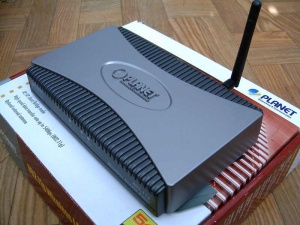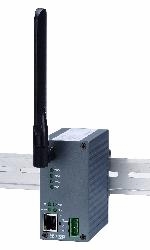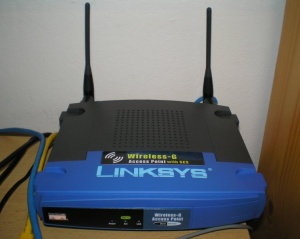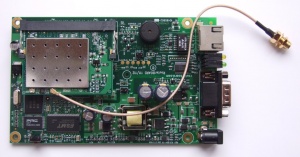Difference between revisions of "Access Point"
Onnowpurbo (talk | contribs) (New page: thumb|Planet WsAP-4000 Wireless Access Point thumb|Neteon Industrial Wireless Access Point In [[computer networ...) |
Onnowpurbo (talk | contribs) |
||
| Line 46: | Line 46: | ||
* [[Hotspot (Wi-Fi)|Hotspots]] - access points or wireless networks open to the public | * [[Hotspot (Wi-Fi)|Hotspots]] - access points or wireless networks open to the public | ||
* [[Wireless LAN]] - networks consisting of zero or more access points plus devices | * [[Wireless LAN]] - networks consisting of zero or more access points plus devices | ||
| − | * [[Wireless bridge]] - between networks sharing same Service Set Identifier (SSID) and radio channel | + | * [[Wireless bridge]] - between networks sharing same [[Service Set Identifier]] ([[SSID]]) and radio channel |
* [[Wi-Fi Array]] System of multiple APs | * [[Wi-Fi Array]] System of multiple APs | ||
* [[LWAPP]] - Lightweight Access Point Protocol used to manage a large set of WAPs | * [[LWAPP]] - Lightweight Access Point Protocol used to manage a large set of WAPs | ||
* [[WarXing]] - searching for open networks | * [[WarXing]] - searching for open networks | ||
* [[Femtocell]] - a local-area [[base station]] using [[cellular network]] standards such as [[UMTS]], rather than [[Wi-Fi]] | * [[Femtocell]] - a local-area [[base station]] using [[cellular network]] standards such as [[UMTS]], rather than [[Wi-Fi]] | ||
| − | * [[WiMAX]] - wide-area wireless standard that has a few elements in common with Wi-Fi | + | * [[WiMAX]] - wide-area wireless standard that has a few elements in common with [[Wi-Fi]] |
Latest revision as of 15:25, 26 January 2010
In computer networking, a wireless access point (WAP) is a device that allows wireless communication devices to connect to a wireless network using Wi-Fi, Bluetooth or related standards. The WAP usually connects to a wired network, and can relay data between the wireless devices (such as computers or printers) and wired devices on the network.
Industrial grade WAPs are rugged, with a metal cover and a DIN rail mount. During operations they can tolerate a wider temperature range, high humidity and exposure to water, dust, and oil. Wireless security includes: WPA-PSK, WPA2, IEEE 802.1x/RADIUS, WDS, WEP, TKIP, and CCMP (AES) encryption. Unlike home consumer models, industrial wireless access points can also be used as a bridge, router, or a client.
Introduction
Prior to wireless networks, setting up a computer network in a business, home, or school often required running many cables through walls and ceilings in order to deliver network access to all of the network-enabled devices in the building. With the advent of the Wireless Access Point, network users are now able to add devices that access the network with few or no cables. Today's WAPs are built to support a standard for sending and receiving data using radio frequencies rather than cabling. Those standards, and the frequencies they use are defined by the IEEE. Most WAPs use IEEE 802.11 standards.
Common WAP Applications
A typical corporate use involves attaching several WAPs to a wired network and then providing wireless access to the office LAN. The wireless access points are managed by a WLAN Controller which handles automatic adjustments to RF power, channels, authentication, and security. Further, controllers can be combined to form a wireless mobility group to allow inter-controller roaming. The controllers can be part of a mobility domain to allow clients access throughout large or regional office locations. This saves the clients time and administrators overhead because it can automatically re-associate or re-authenticate. Further, multiple controllers and all of the hundreds of access points attached to those controllers can be managed by a software called Cisco Wireless Control System Which handles the same functions as a controller yet adds the bonus features of mapping user or RFID locations to an uploaded map, upgrading controllers and access point firmware, and rogue detection/handling. In this instance, the WAP functions as a wireless gateway for clients to access the wired network.
A Hot Spot is a common public application of WAPs, where wireless clients can connect to the Internet without regard for the particular networks to which they have attached for the moment. The concept has become common in large cities, where a combination of coffeehouses, libraries, as well as privately owned open access points, allow clients to stay more or less continuously connected to the Internet, while moving around. A collection of connected Hot Spots can be referred to as a lily-pad network.
The majority of WAPs are used in Home wireless networks. Home networks generally have only one WAP to connect all the computers in a home. Most are wireless routers, meaning converged devices that include the WAP, a router, and, often, an ethernet switch. Many also include a broadband modem. In places where most homes have their own WAP within range of the neighbors' WAP, it's possible for technically savvy people to turn off their encryption and set up a wireless community network, creating an intra-city communication network without the need of wired networks.
A WAP may also act as the network's arbitrator, negotiating when each nearby client device can transmit. However, the vast majority of currently installed IEEE 802.11 networks do not implement this, using a distributed pseudo-random algorithm called CSMA/CA instead.
Wireless Access Point vs. Ad-Hoc Network
Some people confuse Wireless Access Points with Wireless Ad-Hoc networks. An Ad-Hoc network uses a connection between two or more devices without using a wireless access point: the devices communicate directly when in range. An Ad-Hoc network is used in situations such as a quick data exchange or a multiplayer LAN game because setup is easy and does not require an access point. Due to its peer-to-peer layout, Ad-Hoc connections are similar to Bluetooth ones and are generally not recommended for a permanent installation.
Internet access via Ad-Hoc networks, using features like Windows' Internet Connection Sharing, may work well with a small number of devices that are close to each other, but Ad-Hoc networks don't scale well. Internet traffic will converge to the nodes with direct internet connection, potentially congesting these nodes. For internet-enabled nodes, Access Points have a clear advantage, being designed to handle this load.
Limitations
One IEEE 802.11 WAP can typically communicate with 30 client systems located within a radius of 100 m. However, the actual range of communication can vary significantly, depending on such variables as indoor or outdoor placement, height above ground, nearby obstructions, other electronic devices that might actively interfere with the signal by broadcasting on the same frequency, type of antenna, the current weather, operating radio frequency, and the power output of devices. Network designers can extend the range of WAPs through the use of repeaters and reflectors, which can bounce or amplify radio signals that ordinarily would go un-received. In experimental conditions, wireless networking has operated over distances of several kilometers.
Most jurisdictions have only a limited number of frequencies legally available for use by wireless networks. Usually, adjacent WAPs will use different frequencies (Channels) to communicate with their clients in order to avoid interference between the two nearby systems. Wireless devices can "listen" for data traffic on other frequencies, and can rapidly switch from one frequency to another to achieve better reception. However, the limited number of frequencies becomes problematic in crowded downtown areas with tall buildings using multiple WAPs. In such an environment, signal overlap becomes an issue causing interference, which results in signal dropage and data errors.
Wireless networking lags behind wired networking in terms of increasing bandwidth and throughput. While (as of 2004) typical wireless devices for the consumer market can reach speeds of 11 Mbit/s (megabits per second) (IEEE 802.11b) or 54 Mbit/s (IEEE 802.11a, IEEE 802.11g), wired hardware of similar cost reaches 1000 Mbit/s (Gigabit Ethernet). One impediment to increasing the speed of wireless communications comes from Wi-Fi's use of a shared communications medium, so a WAP is only able to use somewhat less than half the actual over-the-air rate for data throughput. Thus a typical 54 MBit/s wireless connection actually carries TCP/IP data at 20 to 25 Mbit/s. Users of legacy wired networks expect faster speeds, and people using wireless connections keenly want to see the wireless networks catch up.
As of 2007 a new standard for wireless, 802.11n is awaiting final certification from IEEE. This new standard operates at speeds up to 540 Mbit/s and at longer distances (~50 m) than 802.11g. Use of legacy wired networks (especially in consumer applications) is expected to decline sharply as the common 100 Mbit/s speed is surpassed and users no longer need to worry about running wires to attain high bandwidth.
By the year 2008 draft 802.11n based access points and client devices have already taken a fair share of the market place but with inherent problems integrating products from different vendors.
Security
Wireless access has special security considerations. Many wired networks base the security on physical access control, trusting all the users on the local network, but if wireless access points are connected to the network, anyone on the street or in the neighboring office could connect.
The most common solution is wireless traffic encryption. Modern access points come with built-in encryption. The first generation encryption scheme WEP proved easy to crack; the second and third generation schemes, WPA and WPA2, are considered secure if a strong enough password or passphrase is used.
Some WAPs support hotspot style authentication using RADIUS and other authentication servers.
See also
- Hotspots - access points or wireless networks open to the public
- Wireless LAN - networks consisting of zero or more access points plus devices
- Wireless bridge - between networks sharing same Service Set Identifier (SSID) and radio channel
- Wi-Fi Array System of multiple APs
- LWAPP - Lightweight Access Point Protocol used to manage a large set of WAPs
- WarXing - searching for open networks
- Femtocell - a local-area base station using cellular network standards such as UMTS, rather than Wi-Fi
- WiMAX - wide-area wireless standard that has a few elements in common with Wi-Fi



